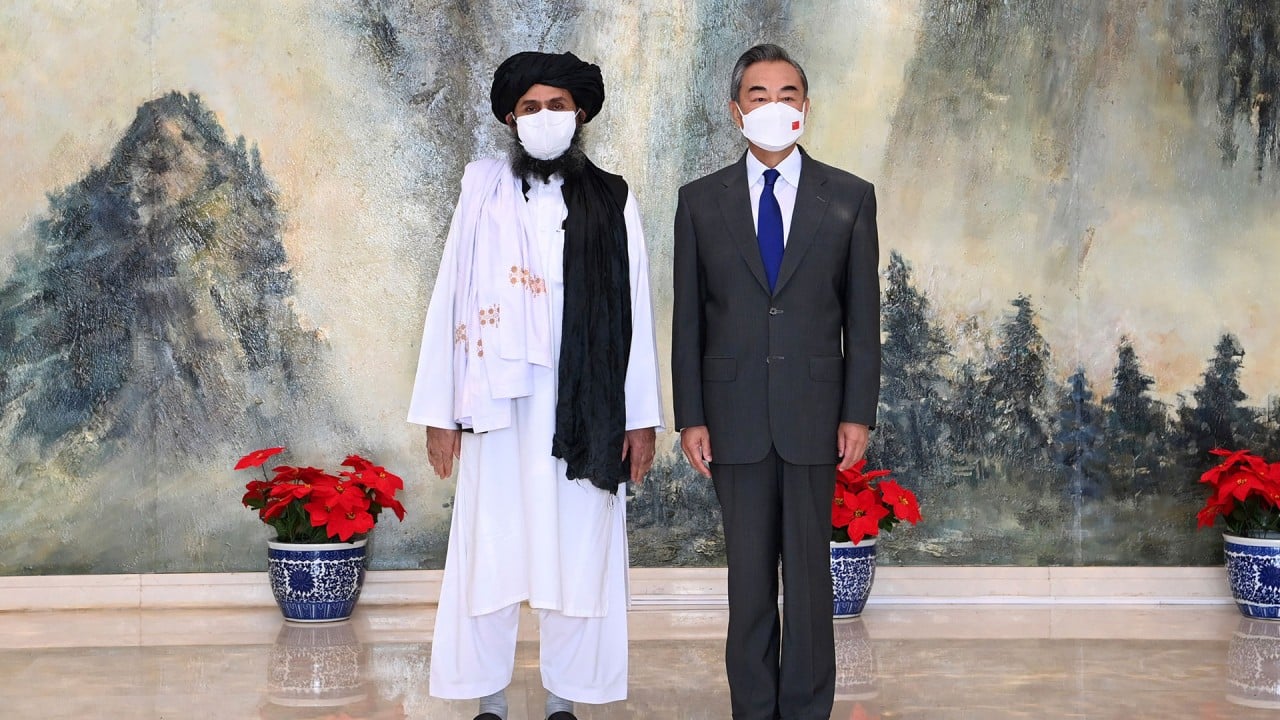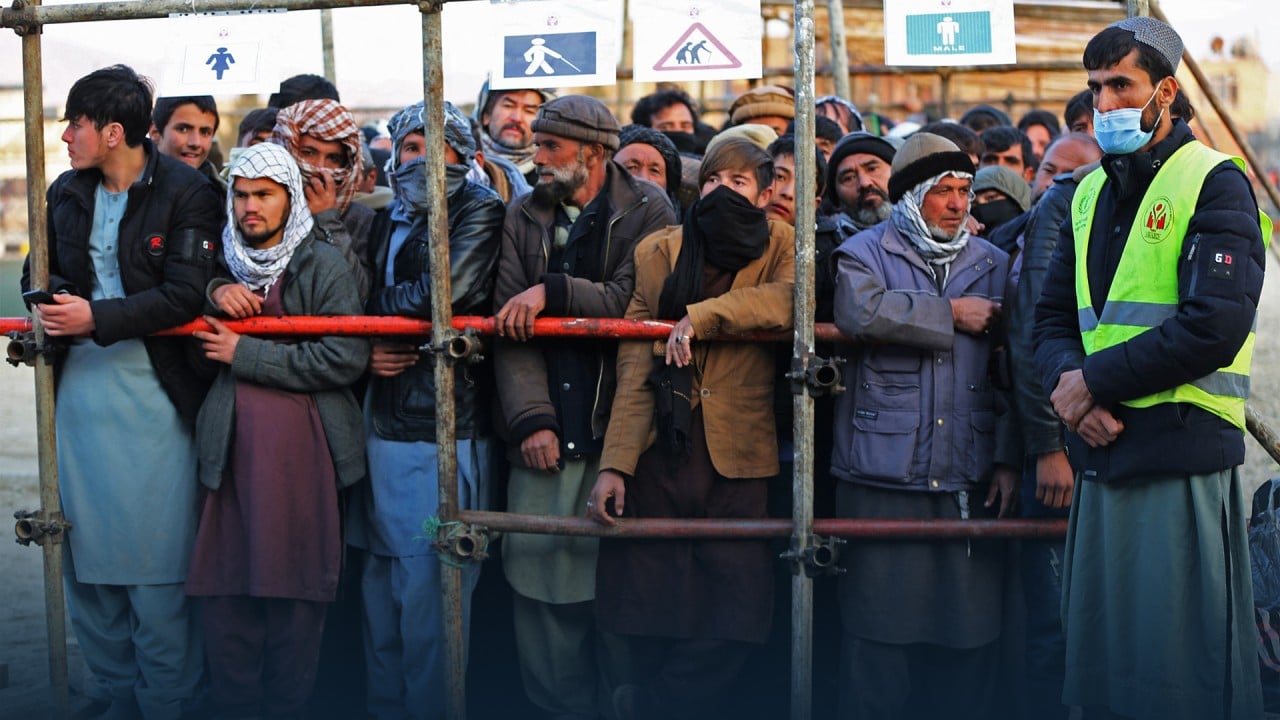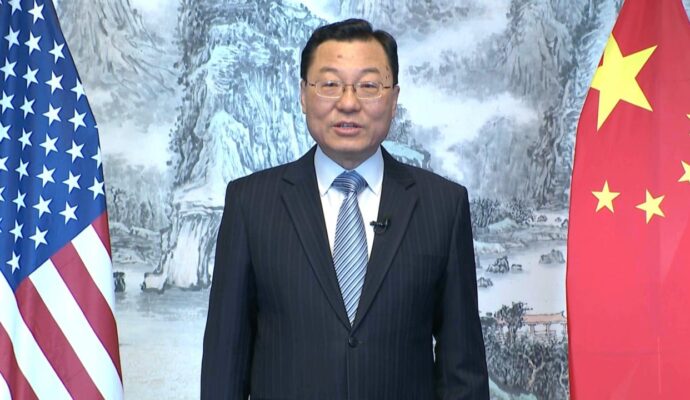China, they suggest, has “vested interests” in engaging with the Taliban and raising its profile on the world stage, including a desire to portray itself as a responsible and inclusive world power.
According to the observers, Beijing could potentially play a big role in boosting the Afghan economy, with some major Chinese firms likely to soon buy into the war-stricken Central Asian country.
Raffaello Pantucci, senior fellow at the S. Rajaratnam School of International Studies in Singapore, said China has been consistent in its support for the Taliban on the world stage and “boosting them and their authority at every turn”.
“This is part of a strategy to embrace them tightly,” he said. “China has become the Taliban-ruled Afghanistan’s most important partner on the world stage.”
While China does not formally recognise the Taliban, last month it appointed a new ambassador to Afghanistan – becoming the first country to do so since the Islamic militants took power.
Apart from the invitation to the third belt and road forum – marking the 10th anniversary of China’s ambitious multinational infrastructure plan – Beijing has ramped up engagement with the Taliban regime in regional formats as well.
Terror threat to Chinese in Afghanistan ‘is challenge to our own’, Taliban vows
Terror threat to Chinese in Afghanistan ‘is challenge to our own’, Taliban vows
Muttaqi also met China’s top diplomat and Foreign Minister Wang Yi on the sidelines of a separate regional forum in Tibet this month, where they agreed to improve trade ties and strengthen cooperation.
“China stands ready to continue to help Afghanistan develop its relations with neighbouring countries and be better integrated into regional economic cooperation,” Wang was quoted as saying in a Chinese readout of their meeting.
Pantucci said China needs Afghanistan – lying across a short border to its west – to remain relatively stable, and sees the Taliban as providing that option. On the other hand, as the diplomatically isolated Taliban craves international support, Beijing is “willing to provide this”.
“[China] has done everything except formally recognising the Taliban as the legitimate government of the country, and inviting them to the belt and road summit is merely another expression of this.”
Dirk van der Kley, a research fellow at the Australian National University, said China wishes to see an Afghanistan that is prosperous and supports it on the global stage.
Given its limited ability to influence Afghanistan’s stability, Beijing’s invitation for the Taliban to attend China-led forums – such as the belt and road summit – is a “low-cost way to signal support”, van der Kley said.
Pantucci also highlighted Beijing’s concerns about Uygur militants gathering in Afghanistan and using it as a base from which to strike China.
As early as October 2021, just over two months after the Taliban took over Kabul, Wang called on the administration to “take effective measures to resolutely crack down” on ETIM and related militant groups.
Taliban ‘committed’ to safety of Chinese in Afghanistan after Isis attack
Taliban ‘committed’ to safety of Chinese in Afghanistan after Isis attack
“This issue continues to be a priority, and from China’s perspective one way to get the local authorities to help deal with it is to win them over with friendship and investment,” Pantucci said, adding that China has a “vested interest” in ensuring Afghanistan stays stable.
“More generally, there are always the risks posed by an unstable Afghanistan to the wider region, which would have repercussions both for Chinese investments, but also potentially back to Xinjiang and China directly.”
Richard Ghiasy, senior fellow at the Netherlands-based Leiden University’s Leiden Asia Centre, said China sees the regime as being in power for the foreseeable future.
Even if China does not agree with some of the Taliban’s values, their interests – such as a “mutual dislike” for American presence in the region and developing Afghanistan – align “fairly closely”, Ghiasy said.
Jiayi Zhou, a researcher at the Stockholm International Peace Research Institute, said China’s growing interactions with the Taliban should be viewed as an outcome of the region normalising trade, economic and diplomatic relations with the group.
“As a neighbouring country with security and economic interests at stake, China has much more incentive to work with the Taliban than against them,” she said.
Zhu Yongbiao, a professor at the Centre for Afghanistan Studies at Lanzhou University, said the geographical closeness of the two countries meant that Afghanistan’s domestic situation would have a relatively large impact on China.
This is why China has to make “necessary contacts with Afghanistan under any circumstances”.
“A stable Afghanistan is crucial to China as it will greatly reduce the possibility of spillover risks and save China of its political, economic, military and diplomatic resources.”
Zhu added that engaging with Afghanistan would not only allow China to be viewed as a “responsible major power” but doing so could also guide Kabul “back on track” and resolve the humanitarian crisis there.
“China is providing Afghanistan and the Taliban with opportunities and platforms for exchanges with the international community. Because China believes that this will help promote changes in the Taliban and make it develop in a more moderate direction,” he said.
Ghiasy similarly said that China’s move to involve the Taliban in regional meetings helped Beijing to build strategic trust in the region and portray the image of an impartial and inclusive actor.
“This provides invaluable strategic and political soft power,” he said.
Zhu said the Taliban’s presence at the belt and road forum – one of a handful of large-scale multilateral summits the regime had attended – was “indeed a step forward”.
“China believes that inviting the Taliban to take part in multilateral mechanisms will help to improve Afghanistan’s own survival capabilities and help unleash its economic growth potential,” he said.
Afghanistan plunged into chaos and poverty following the Taliban takeover in 2021, with its economy suffering the impact of wide-ranging sanctions on the regime imposed by the US and its Western allies.
China, Afghanistan and Pakistan have in recent months discussed including Kabul in the US$60 billion China-Pakistan Economic Corridor, a flagship belt and road project in Asia. Analysts earlier said such a move would be a win for investment-hungry Afghanistan.
Ghiasy said China could play a tremendous role in Afghanistan’s economy – but only on paper.
“China is the world’s number one factory, and Afghanistan is one of the world’s primary raw material trustees,” he said, noting that China needs raw materials such as lithium and Afghanistan has them in abundance
However, in practice, the global isolation of the interim Afghan government and the lack of infrastructure in the country were “considerable hurdles”.
Ghiasy said China could help to build Afghanistan’s severe critical infrastructure deficit and support processes like raw material extraction but “economic development … ultimately come from within”.
Van der Kley was of a similar opinion. He said China’s role in the struggling Afghan economy would remain small, as the country was “too unstable for wide-ranging investments”.
Suicide ‘everywhere’ among Afghan women, UN official says
Suicide ‘everywhere’ among Afghan women, UN official says
A stream of Chinese investments has flown into Afghanistan since the Taliban takeover, but analysts point out that most have been in the private sector, with state-owned enterprises and policy banks taking a more cautious approach.
Chinese state-owned enterprises are likely to remain on the sidelines, at least until the risk posed by sanctions was resolved, Zhu said.
This means China’s priority at this point is to “guide” the Taliban and provide platforms for communication while avoiding a humanitarian crisis in the war-torn country.
Noting that China’s investments have not been as big as expected, Pantucci said the Taliban have found in China “a power that does seem to be interested and continues to try to find ways to encourage investment”.
Ghiasy sees bilateral ties as likely to develop more closely, with Afghanistan helping to soften China’s food security problems and offer a market for some Chinese consumer goods.
Afghanistan could also be critical for landlocked Central Asia in the development of alternative routes to the sea and with Pakistan, he said.
Pantucci expects more big Chinese firms to explore Afghan options and sign contracts there.
“The pace of meetings does appear to have picked up over the past few months,” he said.
“The attendance of the Taliban leadership at the belt and road summit will be a signal to Chinese companies out there that the state is supportive and in fact this is something the government wants.”




